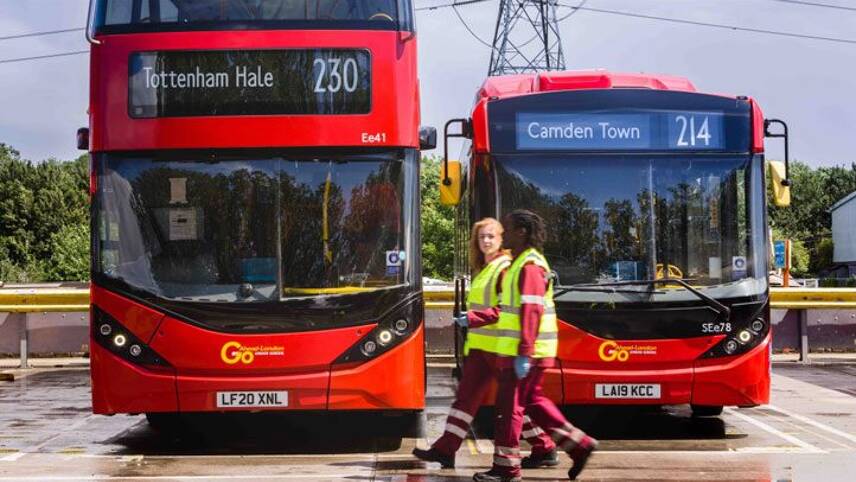Register for free and continue reading
Join our growing army of changemakers and get unlimited access to our premium content

Image: Go-Ahead Group
Go-Ahead Group has already delivered a 22% reduction in its absolute carbon emissions since 2016 – an achievement that led to the firm receiving a CDP ‘A-List’ rating. But the firm’s chief strategy and customer officer Katy Taylor said that delivering against the new commitments will be “no small task” and will “impact all areas of the business”.
Major changes set to be delivered as part of the plan include transitioning to a fully electric and hydrogen fleet of buses and trains across the UK by 2035.
Go-Ahead Group operates 5,000 buses and claims to have the largest electric bus fleet of any UK-based public transport operator. It already has two all-electric bus depots, in Waterloo and Northumberland Park respectively. On trains, the firm is similarly the UK’s largest operator of electric trains but does not disclose how many diesel trains it also operates.
There are also commitments to deliver net-zero properties and to replace all vehicles in the ancillary fleet with zero-emission alternatives by 2035. For some more specialist vehicles, Go-Ahead Group said in a statement, alternative technologies are not yet mature.
The emissions mitigation targets do not, at present, cover Scope 3 (indirect) sources. Go-Ahead has pledged to develop targets for upstream and downstream emissions, which collectively account for some 40% of its overall footprint, as a priority.
There will also be further measures to “embed” the climate strategy into business protocols announced in the coming months, including “responsibilities and ownership mechanisms”.
Aside from reducing emissions from Go-Ahead Group’s fleets and properties, the updated climate strategy details targets to cut air pollution; reduce water use by 25% by 2025; increase the firm’s recycling rate to 60% and improve climate adaptation efforts.
This latter point comes shortly after the Climate Change Committee (CCC) warned that climate risks to the UK are increasing in number and magnitude more rapidly than expected, with billions of pounds worth of infrastructure at risk through to 2050.
Go-Ahead Group has already begun the process of measuring and reporting climate risks in line with the recommendations of the Taskforce on Climate-Related Disclosures (TCFD), ahead of a legal mandate to do so, being implemented in either 2022 or 2023 by the UK Government. Its next steps will be quantifying the cost of adaptation and sourcing funding in order to build the business case for adaptation measures, as well as working with suppliers to help them identify and reduce their own risks.
“The journey we are embarking on requires a great deal of collaboration – with governments, with partners and with suppliers,” Go-Ahead Group’s chief executive David Brown said. “We will work together to ensure a sustainable world for future generations.”
Transport Decarbonisation Plan
The launch of Go-Ahead Group’s new climate strategy has come as the Government is unveiling its long-awaited Transport Decarbonisation Plan. This framework was originally due out in late 2020 but has been delayed due to Covid-19, and, allegedly, criticisms over the initial measures and targets not being ambitious enough to align with net-zero by 2050.
There are commitments to end the sale of new petrol and diesel heavy goods vehicles (HGVs) and buses by 2040, subject to consultation; to electrify the Government’s own fleet by 2027 and to accelerate spending on public transport and active travel. Also detailed are plans to bring the aviation sector’s emissions to net-zero by 2050 without capping growth, with an ambition to enshrine an earlier 2040 target in law for domestic aviation and airport buildings and operations in England.
The Department for Transport (DfT) has not yet published the full document for the Plan. However, in the media information provided by the Department, details on decarbonizing buses were sparse. The only mention was of the National Bus Strategy, which is currently under consultation. That Strategy will mandate an end-date for the sale of petrol and diesel buses but the timeline is to be confirmed.
Join the conversation at edie’s Clean Energy & Transport Forum
On Thursday, July 15, edie is hosting its first Clean Energy and Transport Forum.
Linking to the two key COP26 themes of Clean Energy and Clean Transport, this brand new virtual conference will explore what it will take to deliver the net-zero transition in these key sectors.
The Department for Transport’s Parliamentary Under-Secretary of State Rachel Maclean has been confirmed as one of the keynote speakers, alongside Energy Institute chief executive Nick Wayth; The Climate Group chief executive Helen Clarkson and Innovate UK senior Innovation lead Harsh Pershad.
Click here for a full agenda and to register for the Clean Energy and Transport Forum.
Sarah George


Please login or Register to leave a comment.